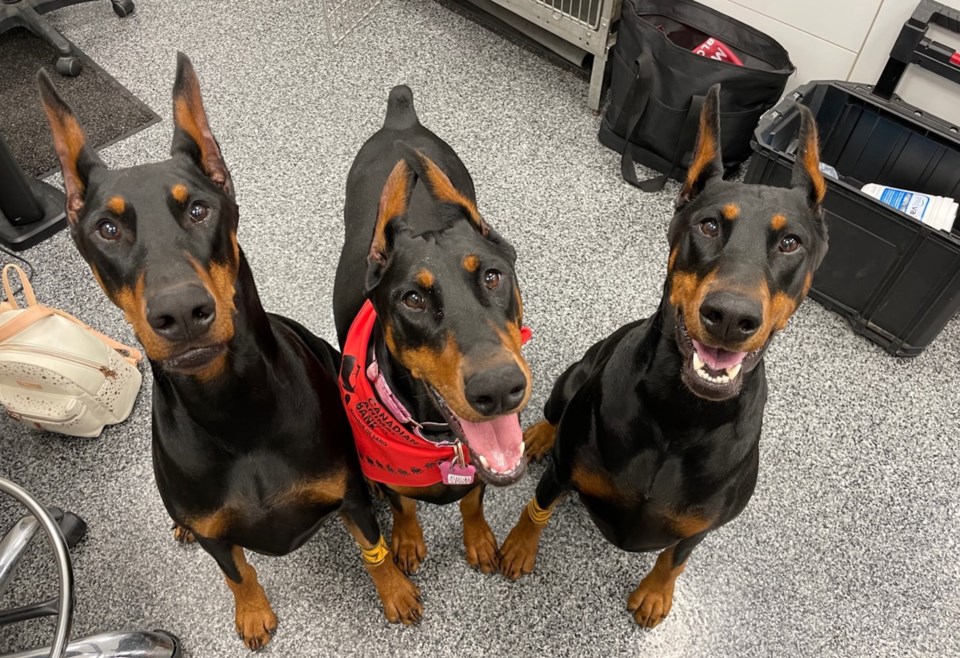Everyone knows that humans can donate their blood to those who need it, but few are probably aware that dogs can do the same.
Cochrane dog-owners can volunteer their pooches to donate blood for a paws-itive cause at two upcoming canine blood drives this fall. The clinics run Sept. 18 at Arrowhead Veterinary Centre and Oct. 13 at Cochrane Animal Clinic. Both run from 9 a.m. to 1 p.m.
The canine blood drives are put on by Canadian Animal Blood Bank (CABB), a Manitoba-based non-profit that has recently expanded its presence in Alberta, including Cochrane.
Bobbie Deschamps, the general manager for CABB’s western division, said the organization is still growing its reputation.
“One of our biggest hurdles is people knowing we exist,” she said. “We like to say we're Canada's best-kept secret that everybody should know about. When people know we exist, they're more than willing to help.”
According to Deschamps, CABB’s mandate is to collect donated blood from family-owned pets at locally held blood drives and clinics. The donated blood products are then shipped to wherever they are needed to be used in transfusions for canine surgeries and operations.
Deschamps said the demand for canine blood has more or less doubled in the last year – an increase she said is likely due to a few different pandemic-related factors. She noted there was an influx of dog adoptions in 2020 and 2021 across Canada, some of whom may have been older rescues who were more likely to require blood transfusions.
“But we also wonder if just people were being at home with their pets [more] – spending all that time with their animals, and really strengthening that bond,” she said. “Perhaps it has something to do with that.”
In order to host their blood drives, Deschamps said CABB partners with veterinary clinics around western Canada. Their partner clinics in Cochrane are the Arrowhead Veterinary Centre and the Cochrane Animal Clinic.
“These host clinics volunteer their space and time, which is instrumental,” Deschamps said. “If we didn't have the space and support of these hospitals, we wouldn't be able to do what we do. Arrowhead has been with us for many years, and we just welcomed the Cochrane Animal Clinic.”
For Cochranites who are interested in volunteering their pooches to donate blood, Deschamps stressed that there are a few conditions that must be met first. For instance, she said donors must weigh 55 pounds or more and be between one and eight years old. Giant breeds like St. Bernards need to have fully finished growing.
In addition, donors must have their updated core vaccines and be free of medications that would restrict them from donating blood.
Disposition is also important, according to Deschamps, who said CABB staff ask that donors are OK with being handled. They don't necessarily need to be calm dogs, she said, but they should enjoy being touched and able to sit still for a few minutes. To ensure the donors are as comfortable as possible, she said the dogs are showered with praise and given treats throughout the donation process.
“It's important these dogs are happy and comfortable to move forward,” she said. “At any point the dogs are uncomfortable, we would stop the donation or not go forward.”
Like humans, dogs also have blood types, some of which are more in demand for transfusions than others. Deschamps said the most common canine blood type is called DEA-1 (DEA stands for Dog Erythrocyte Antigen). She said dogs are either DEA-1 negative or DEA-1 positive, and that the majority are DEA-1 positive. She equates DEA-1 negative as the “o-negative of the human world” equivalent.
Deschamps said any dog owners can contact CABB if they have any questions about their pet’s ability to donate blood. And if their dog doesn't fit with the eligibility requirements, she said another way to support the organization's mandate is by providing cash donations.
According to Deschamps, side effects are very rare when dogs donate blood, but staff ask that donors are fasted on the day they come in, to limit the amount of fat in their blood cells.
“In people, fainting is something that happens quite commonly, but that's actually quite abnormal with our dogs,” she explained. “Dogs might be a little quieter, or on the other end, they might have a bit of extra energy because they're excited for the visit.”
She added both upcoming clinics in Cochrane are still in need of donors. Interested pet-owners can reach out to CABB’s Calgary region director Kristina Walker by emailing [email protected] to book an appointment.
For more information on CABB, visit canadiananimalbloodbank.ca or email [email protected]. The organization also has a Facebook page which is regularly updated.



